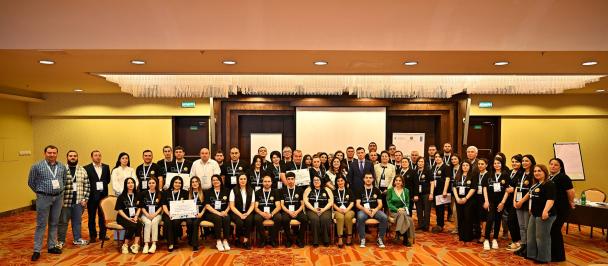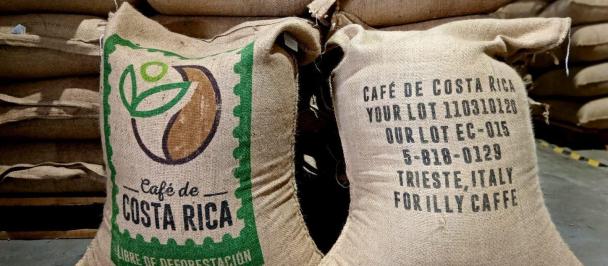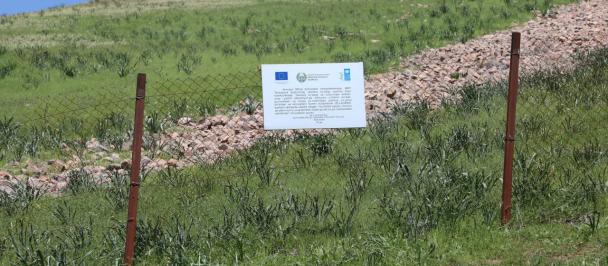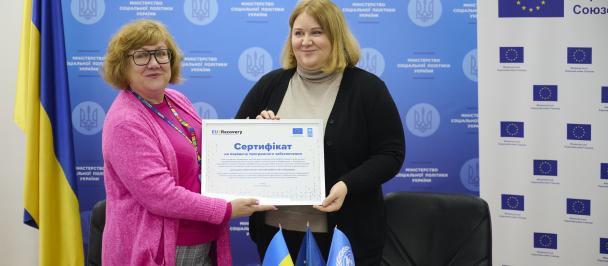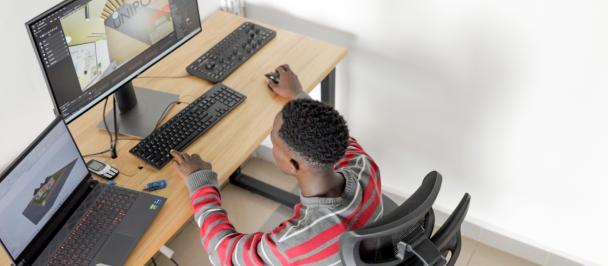In this interview, Ahunna Eziakonwa, Director of the UNDP Regional Bureau for Africa, reflects on UNDP’s development priorities at the regional level and how the organization supports communities and governments in advancing sustainable development in Africa. This interview was conducted ahead of the RSCA Open House and the 37th African Union (AU) Summit held in Addis Ababa, Ethiopia.
Towards a prosperous Africa: a conversation with Ahunna Eziakonwa
February 19, 2024

Ahunna Eziakonwa (left) meets with Abiy Ahmed, Prime Minister of Ethiopia on the sidelines of the 37th African Union Summit in Addis Ababa, Ethiopia.
What does your role look like on a day-to-day basis?
My role is to ensure that the United Nations Development Programme – the UN’s lead development entity – delivers for Africa. That because UNDP is present in Africa, we start to see the full potential and unmatched promise of this great continent, manifest.
My role is to ensure that the 46 Country Offices I oversee in Africa are at the cutting edge of unlocking new frontiers in accelerating Africa’s development. My role is to ensure that the development focus and narrative concerning Africa remains focused on an approach that creates prosperity.
It is quite like the proverbial orchestra. I have an excellent team of leaders, or players if you like, maestros in their field, and mine is to lead us all to that masterpiece – one that ensures that metric by metric, we are defeating poverty, creating prosperity and advancing on the sustainable development goals in Africa.
The African Union theme for 2024 is education. What message do you have for African leaders and decision-makers following the AU Summit?
To the distinguished leaders and decision-makers that gathered at the African Union Summit - Let us recognize that education is the most powerful currency in today’s knowledge economy, and it is through lifelong learning that we will continue to secure prosperity for Africans in Africa but also Africa’s place in the world. In the words of Kofi Annan, ‘Knowledge is power. Information is liberating. Education is the premise of progress, in every society, in every family’ – these sentiments, I share. Lifelong learning must be woven into the very fabric of our development plans, because to educate the people is to empower our continent. Development and education are twin forces; operating in synchrony to drive each other forward. As we deliberate on our educational strategies, let us pivot to the kind of education that will transform Africa.
In today’s interconnected world, the challenges we face are not confined by geographic boundaries. Global threats like the COVID-19 pandemic, climate change and economic instability have shown us the limitations of country-focused approaches. We do need to invest within countries – make no mistake. But more and more, we must think borderless.
What are the unique strengths in regional development interventions and how do they complement national programmes?
In today’s interconnected world, the challenges we face are not confined by geographic boundaries. Global threats like the COVID-19 pandemic, climate change and economic instability have shown us the limitations of country-focused approaches. We do need to invest within countries – make no mistake. But more and more, we must think borderless.
It is not just the challenges. It is principally the opportunities. Take trade. How can Africa seize the full potential of its industrial potential except by dismantling barriers to regional trade and making the AfCFTA work? How can Africa offer opportunities for its large youth population, except by opening borders for foreign skills?
Regional development interventions also align with our shared African heritage of Ubuntu. The African ethos that recognizes the value in the next person – knowing that I am because you are…and I am because we are. At UNDP, we believe in the power of regional solutions and in south-south cooperation. For this reason, we invest at the regional level to ensure that we do not miss any opportunities whose harvesting requires cross-border interventions, and that we support countries with readiness to stem those challenges whose reach is cross-border.
Why are partnerships so crucial to UNDP’s successes in Africa?
Partnerships are the lifeblood of our successes at the RBA. Partnerships are at the very core of this philosophy. They are crucial, because no single entity holds all the answers to unlocking Africa’s promise. By forging strong partnerships, we harness diverse strengths, perspectives, and resources. Our collaborations with governments, regional bodies, civil society, and the private sector create robust and resilient solutions for sustainable development. These alliances allow for the sharing of knowledge, the pooling of resources, and the scaling of innovations, ensuring that our collective impact is greater than the sum of our parts. Partnerships enable us to transform individual successes into regional progress and to turn the promise of development into a palpable reality across Africa.
What is the most rewarding part of your work?
Seeing change on the ground in Africa. UNDP is a unique kind of institution. Because we work with governments and communities on the ground, we have the ability to see the impact of our investments. There is nothing quite like that – the satisfaction that because UNDP intervened with partners on the ground, something changed – for the better.
Take Tamale in northern Ghana, and the women that produce shea butter. I was amazed to see what a UNDP investment does in making available to them means that boost their production and capability to export to markets as far as the US. They have larger incomes and can change their families and their communities.
But let me also say that I can see the transformation emerging across Africa – in terms of the ability to visualize a future of prosperity – based off Africa’s own assets. The idea that Africa’s money can and must work on Africa’s development is one I hold dear – and one I am seeing sprout across Africa. We see it in the trade and regional integration initiatives under the African Continental Free Trade Area (AfCFTA); and we see it also in climate action.
This is uniquely rewarding because we have been preaching this gospel at UNDP since I assumed the Director role at the Regional Bureau for Africa. I am thrilled because I am fully convinced that this is what it will take transform the continent – for the better.
Background
The UNDP Regional Service Centre for Africa (RSCA) organized an Open House on 15 and 16 February 2024 to showcase how UNDP, through the RSCA, collaborates with communities and governments across the 46 countries of the Regional Bureau for Africa. The Open House served as a platform to exchange with high-profile public officials, policymakers, thinkers, innovators and changemakers on the value proposition of UNDP.
Teams representing the RSCA office in Addis Ababa, and sub-regional hubs in Pretoria, Nairobi and Dakar also had an opportunity to showcase some of the work we do and support through panel discussions, a report launch, an exhibition, a film screening, and networking events.
The Open House kicked off with the first edition of the new RSCA policy dialogue series, A Continent in Conversation, where high-level speakers outlined their priorities for African engagement across geopolitical divides in a multipolar world. The launch of the 2023 Sahel Human Development Report presented the report’s findings and recommendations, highlighting synergies between a balanced sustainable energy transition and the development priorities of the Sahel. The final event was a screening of the 'Borderlands' documentary produced by the UNDP Africa Borderlands Centre.
Biography
Ms. Ahunna Eziakonwa is UNDP Assistant Administrator, and Director, Regional Bureau for Africa at the rank of Assistant Secretary General. She leads over 4000 staff implementing a $1.2 billion annual development programme in 46 African countries. She is deeply passionate about equality, inclusion, reshaping narratives on Africa, mobilizing for youth entrepreneurs and the dignity of Africa’s people. Her vision “Africa’s Promise: The UNDP Renewed Strategic Offer in Africa” employs an opportunity lens to development practice in Africa. She established the Africa Influencers for Development (AI4D) to ensure that Africa’s Money works for Africa’s Development; the Africa Young Women Leaders Initiative; Africa Innovates Magazine; and the Africa Borderlands Centre. She leads UNDP Africa socioeconomic response and recovery from COVID 19 and (Co) Chairs the UN Africa Regional Collaborative Platform which oversees implementation of the Secretary General’s regional UN reform. She spent 10 years as UN Resident and Humanitarian Coordinator in Ethiopia, Uganda, and Lesotho. As Chief (Africa) at UN OCHA, she led response to natural disasters, emergencies and transitions to recovery. Before the UN, Ms. Eziakonwa worked for “Initiatives of Change” serving as international coordinator of its’ “Creators of Peace – Women’s Initiative”. She is an alumni of Columbia University’s School of International and Public Affairs, Harvard Kennedy School Executive Programme and has a Bachelors in Education from University of Benin Nigeria.

 Locations
Locations






